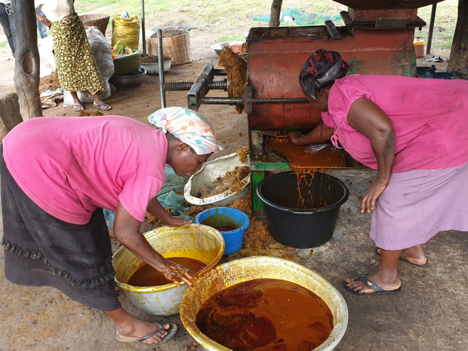The country’s palm oil production is set to increase by an average of 4.4% year-on-year from 2021 to 2025, with the growth rate increasing at the end of that period.
According to Bloomberg and Fitch Solutions, Ghana is poised to overtake Ivory Coast to become the lead exporter and earner of palm oil production in West-Africa for the next five years. Government in recent times has provided support for the sector in multiple ways, which Fitch Solutions and Bloomberg believe will incentivise further investment in the coming years.
Palm oil production was a leading foreign exchange earner for the country from about the mid-nineteenth century to beginning of the twentieth century. Ghana currently has an unmet demand of 35,000 tonnes of palm oil.
Fitch Solutions says a number of recent establishments of both industry and government bodies to regulate and support the palm oil industry have improved the national sector’s potential compared with other countries in the region.
The Oil Palm Development Association of Ghana (OPDAG) was revived in 2015, and is supported by Solidaridad in a strategic plan to improve its governance and administration by 2024.
Indeed, there has been notable foreign investor interest in West African palm oil from 2010-2015; however, challenges like poor land ownership, illegal imports and sub-optimal growing conditions still exist.
A large percentage of the palm oil produced by small-scale processors cannot be utilised by the larger scale industries in Ghana or abroad because of its poor quality.
According to the Food and Agriculture Organisation (FAO), world production of palm oil is expected to increase from 45 million tonnes to about 60 million tonnes by 2020.
By the end of 2010, approximately 40 – 45,000 hectares had been developed under the plantation expansion programme that was then known as the Presidential Special Initiative (PSI)-Palm Oil. The palm oil industry plays a significant role in improving the country’s balance of payments while creating job opportunities with massive rural employment.
Palm oil is placed prominently among the 11 non-traditional export commodities and services selected in the National Export Strategy. There is a need to concentrate on oil palm cultivation because of its immense economic potential and industrial uses that will help realise critical foreign reserves for the country.
It is gratifying that oil palm cultivation is receiving heightened interest from the investing community, and we hope some of the challenges associated with its production are addressed sufficiently.










